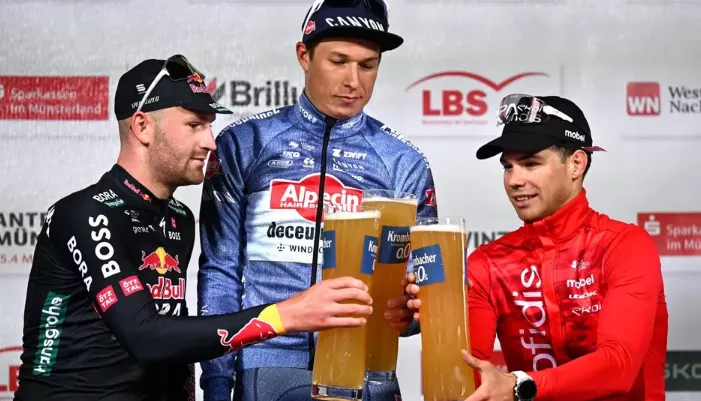As cycling has become synonymous with community and connection, a subtle yet pervasive relationship with alcohol remains a defining feature of the sport. From post-ride celebrations at bars to sponsorship deals with breweries, alcohol has long been intertwined with cycling culture. But for those who choose to abstain, the question arises: Can cycling remain a space for social engagement and camaraderie without the presence of alcohol?
For one cyclist, the struggle to fit into a drinking-dominated culture is all too real. Nearly a decade ago, their introduction to cycling involved joining a social ride group where the cycling and drinking cultures were closely linked. Rides often began with happy hour, included a mid-ride beverage stop, and concluded with a post-ride celebration at the local bar. Though their club may have been an extreme example, it represents a broader trend where cycling, for many, is often as much about the socializing as it is about the sport itself.
While alcohol is seen by many as a social lubricant, its prominence in cycling culture can be difficult for those who don’t partake. After quitting alcohol nearly two years ago, this cyclist began to notice just how deeply ingrained drinking is in the cycling world. Whether it’s shots of whisky at cyclocross races, charity rides with brewery stops, or the celebratory beer at events like Unbound Gravel, alcohol is often seen as an integral part of the post-ride experience. Yet for non-drinkers, this can leave them feeling isolated during what should be a time for connection.
On a recent ride, the cyclist observed how quickly the group transitioned into the ritual of drinking—stopping for nearly an hour to enjoy trail-side beers. While everyone else sipped, they were left waiting impatiently, longing to focus on the ride rather than the drink. While drinking after a ride is not mandatory, it has certainly become the cultural norm in many cycling circles.
This presents a paradox: cycling, a sport celebrated for its emphasis on health and fitness, often places alcohol—a substance known for its negative health impacts—at the center of post-ride traditions. Alcohol is a diuretic, meaning it dehydrates the body, which can be especially harmful after a physically demanding ride. Sports dietician and cycling coach Kristin Arnold, MS, RDN, CSSD, explains that alcohol can hinder recovery by inhibiting glycogen restoration and vitamin absorption. Consuming alcohol immediately after a ride can even stunt muscle protein synthesis, hindering the body’s ability to rebuild and repair itself.
However, Arnold acknowledges that alcohol isn’t entirely detrimental. It can serve as a social tool, fostering camaraderie among cyclists and creating an enjoyable post-ride atmosphere. She suggests that drinking can be appropriate when the performance demands of training are less stringent, such as during rest weeks or after a major race when recovery is less critical.
Fortunately for non-drinkers, the cycling world is beginning to embrace alternatives. The growing popularity of non-alcoholic beverages is reflected in both market trends and event sponsorship. Between 2021 and 2022, sales of non-alcoholic drinks in the U.S. grew by 20.6%, a sign of the increasing demand for alcohol-free options. Many breweries now offer non-alcoholic beer, kombucha, and sodas, providing cyclists with a broader array of choices. Brands such as Best Day Brewing and Athletic Brewing have even found a strong presence at major cycling events like Unbound Gravel and Big Sugar Gravel, reflecting the growing interest in non-alcoholic sponsorship.
For many cyclists, the social aspect of riding is just as important as the physical challenge. Rides often serve as a time to forge new friendships and connect with others in the community. While there’s no call to dismantle the tradition of post-ride beverages, there’s a growing conversation about how to make these gatherings more inclusive for non-drinkers. One suggestion is to shift the focus of post-ride locations away from alcohol-centric spaces like bars or breweries, and instead consider venues like coffee shops, juice cafes, or picnic spots that offer non-alcoholic refreshments.
Cycling is a sport built on a sense of community, and it’s worth rethinking whether current traditions reflect the inclusivity that many cyclists seek. Non-drinkers don’t need to be sidelined to maintain the social spirit of cycling. By creating space for alternatives, the cycling community can foster a more welcoming environment for all participants. Whether it’s sharing a cup of coffee, a bottle of kombucha, or a cold non-alcoholic beer, the joy of cycling can be celebrated in many ways—allowing riders to focus not just on what’s in their glass, but on the bonds they share through the sport.
Related topics
- Cummings Talks Ineos Exit and New Jayco-AlUla Role
- Biggest Surfing Disappointments of 2024
- Chicago’s Surfing Ban Overturned: A Victory for Local Surfers

